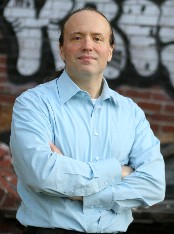For the E3 and GDC events of the world, getting the word out is easy — the events are known worldwide. For smaller events, however, it can be much more challenging especially when you’re starting out. Having grown every year, the Southern Interactive Entertainment and Game Expo (SIEGE) is now becoming one of the best established events in the region and we talked with director Andrew Greenberg about the event and how its marketed.
Tell me a little about the SIEGE event.
This is the fourth year, and the focus has been on creating a strong collegial game industry conference. I was a regular attendee to the Computer Game Conference in San Jose and the atmosphere was great for learning – we’re trying to recreate that for SIEGE. Between the speakers and sessions, we want people to delve into this conference and really get something out of it.
My experience is that we professionals get so heads down in our work, its easy to lose track of the excitement that made us take this [line of work], and bringing in students and people new to the industry helps us get excited again.
What are some of the main challenges in getting the word out for SIEGE?
 Andrew Greenberg
Andrew Greenberg
Our main issue is that SIEGE is an all volunteer effort. I’m not paid, no one is paid on this, so it’s hard to bring in a PR and Marketing to give it the sort of focus that it needs. As a result, most of our marketing is word of mouth from people who have attended in the past.
Segueing nicely, tell me about how having sponsors to the event helps promote SIEGE.
The sponsors help in several ways; one of the big ones is helping us keep the cost of admission below the price of other industry events, with something at less than $100. We release press releases to industry media and adding [the sponsors] names there helps get more responses. There are also eight to 10 CCP people talking at the event that gives it appeal to people who like the game. We also have members of Tripwire Interactive, who made Killing Floor and Rising Storm, there speaking and it shows the quality of presenter that we have at the event.
Tell me about CCP in general as a sponsor and why they’re a great partner.
They’ve done some innovative, cutting edge work in the MMO field. It’s a single shard MMO with hundreds of thousands of gamers and puts MMO games in such a different light. People will come in and listen to CCP members speak and it will really stimulate their project as they and others chew over the ideas. They also throw a real mean party, so it gets stuff off with a bang! On Saturday night, we have people roaming room to room to see what we have to offer.
What about the other Platinum Sponsors of the event?
Tripwire Interactive is similar to CCP; they’re not on the same size but they have a similar high reputation in the industry. Alan Wilson and John Gibson are not just good designers; they have a investment in the region, they want to build up the game industry in the south, so they have an investment in making this a good conference.
Westwood college has been putting a strong emphasis on games, along with development in Flash and Windows Mobile. They’re working on not only teaching their students to design games but also get a balanced education.
Tap Code is our most interesting sponsor, since it’s Nolan Bushnell’s company, which is taking a whole new look at entertainment. Our theme is Fun++, and we’re taking that and we’re looking at a core of play and enhancing that, and Tap Code is a perfect example of that.
Why do you think that regional events like this are important for the gaming industry?
We’d all like to see the gaming industry grow beyond a few urban sectors. We all agree that the wider degree of places game developers come from, the better games will get. We have a session on diversifying communities and women breaking into the industry. We’re looking to go beyond the traditional set of people in the gaming industry .
How do you reach out to local game companies and universities to get them involved?
It’s an interesting process of both showing them the value for their organization and also the value for their employees and students: those are the two main things. We certainly draw a base [amount of people] from this area, but we draw in speakers from Maryland, San Francisco, England, as well.
What are some of the special considerations in advertising for an event that has all the features of a fan convention and a professional conference?
We have a very small advertising budget, so a lot of our outreach to the fan community is dedicated people who search it out. We want people who add to the conference bringing in their knowledge base, but this isn’t a person off the street conference looking to play games; we’re sitting around talking about how to make games.
Ah, so the game sessions are designed to further the learning aspects.
Exactly, playing games is tertiary; it’s more about learning the industry and making connections. I love the fact that studios and students bring out games to get feedback.
Anything else you want to note?
One of the interesting sessions is the ESA setting up a panel with Rich Taylor and government legislators looking at the government impact on game development. We also have great speakers like Nolan Bushnell, Scott Steinberg and several top professors; these are professionals that people don’t know are part of SIEGE, but they’re all looking to further the industry.

